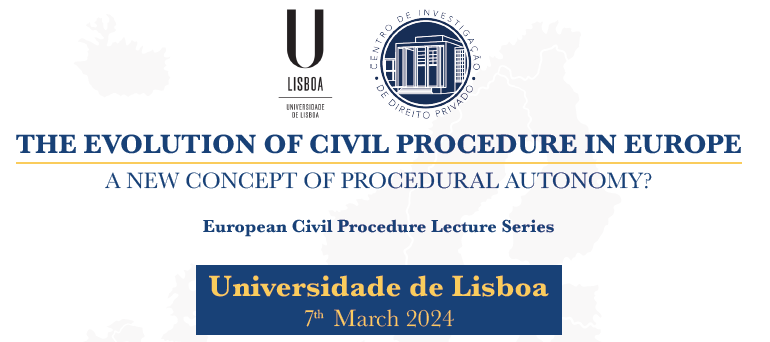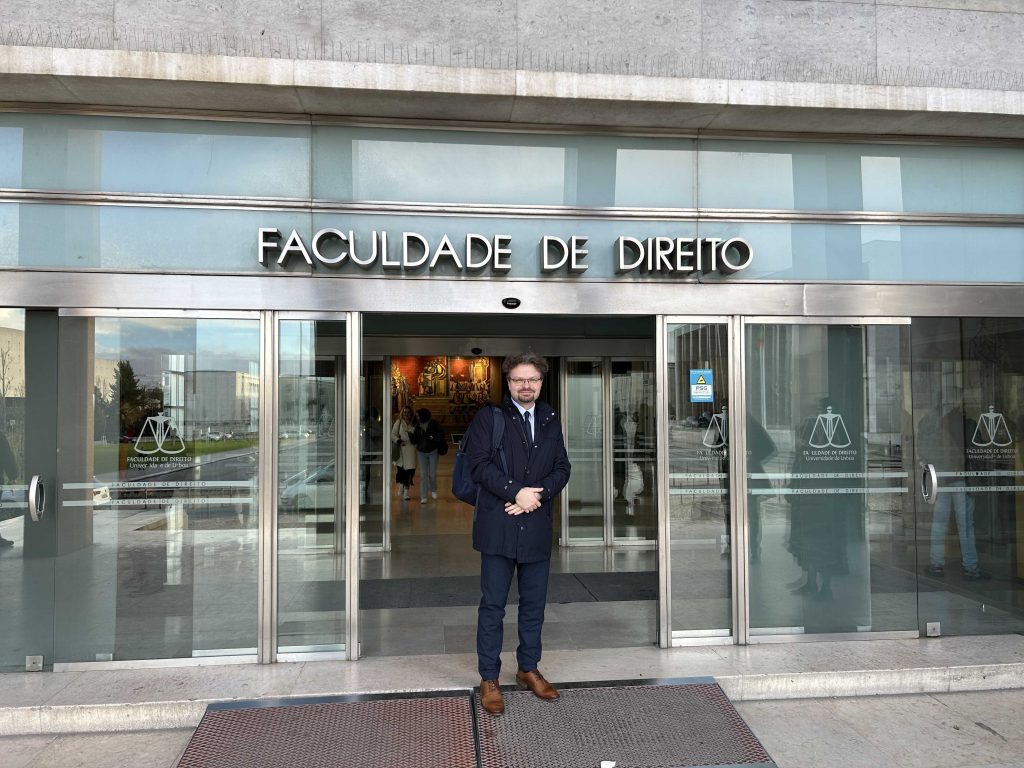
W dniu 7 marca 2024 r. na Wydziale Prawa Uniwersytetu Lizbońskiego (Universidade de Lisboa) odbyła się międzynarodowa konferencja naukowa pt. „The Evolution of Civil Procedure. A New Concept of Procedural Autonomy?”. Wydarzenie było elementem międzynarodowego projektu naukowego „Bridging Procedural Paths: From Harmonisation to Codification of Civil Procedure in Europe”, w który zaangażowani są przedstawiciele wszystkich państw członkowskich Unii Europejskiej.

Wraz z profesorem Andrzejem Olasiem miałem przyjemność zaprezentować polską perspektywę prawa procesowego – wygłosić referat pt. „Influence of EU Law on Consumer in Civil Proceedings. The Polish Experience„, a także uczestniczyć w interesującej dyskusji z udziałem m.in. profesorów Alana Uzelaca oraz Cristopha G. Paulusa.

Summary
Just like in many European Union member states, consumer protection in Poland has been focusing on substantive civil law for years. In time, the need to expand the field to include procedural mechanisms was recognised as well, with the following question asked: how can optimum protection be extended to consumers at the litigation stage? Consequently, Poland can be referred to as an environment of gradual consumer protection proceduralisation within boundaries of procedural autonomy enjoyed by European Union member states. We are all aware that the Court of Justice of the European Union does not impose rigid procedural solutions upon member states. It is expected that consumers will be able to take advantage of legal protection offered by consumer-related directives. Has the effectiveness of EU regulations making up the consumer protection system been assured? Are Polish courts a true guarantor for the consumer? Are the objectives of Directive 93/13 – effectiveness, proportionality and deterrence – truly delivered? Unfortunately, Poland is an example of a state failing to put procedural autonomy to proper use.
We are all aware that the transposition of consumer protection carries two aspects – the normative and the adjudicative. Both the perspective of the Polish legislator and that of courts adjudicating in practice have to be accounted for. I will describe the former in greater detail.
Separate proceedings in cases involving consumers were made part of Polish law in March 2023. Unfortunately, no reliable studies have been carried out to identify the actual needs of the consumer community. Issues associated with procedural aspects of consumer protection – duly diagnosed in the jurisprudence of the Court of Justice of the European Union – were not taken into account. It seems that the legislator’s actions were largely short-sighted, and populist in nature. Current solutions have given rise to serious reservations concerning the applied model of consumer legal protection and its expediency.
Let me highlight two aspects thereof. Issue number one: the paradigm of particular consumer protection seems to have been prima facie preserved. Newly introduced separate proceedings can be used very broadly, applicable to any dispute involving consumers and spanning cases diverse in terms of social gravity and importance. These can be judicial disputes regarding loan agreements or investment funds – or minor and non-complicated cases involving simple goods or services. The accepted pattern of implementing European Union directives has been breached here already. The Polish legislator has failed to recognise the specificity of particular disputes. Procedural judicial responses are automatic, failing to account for manifestations of imbalance between the consumer and business entity in the given dispute.
Issue number two: what is the actual philosophy behind current solutions? Three special solutions are now in force when it comes to judicial disputes involving consumers. These concern the following: firstly, the concentration of procedural material, including allegations of facts and evidence; secondly, court’s domestic jurisdiction; thirdly, the costs of proceedings. Of the three, only the first carries any actual significance. I will therefore put the other two aside.
A unilateral preclusion mechanism was introduced with regard to the concentration of procedural material in cases involving consumers. How does that work? Business entities are obliged to produce all facts and evidence in the initial statement of claim or response thereto on pain of omission: delayed allegations of facts and/or evidence relevant to the case may be declared null and void, and/or of no practical significance. Such strict limitations do not apply to the consumer. Such unilateral establishment of the moment of preclusion is in breach of the principle of equal treatment of parties. It fails to balance out actual inequalities between parties. In particular, it does not address the issue of information imbalances as well as ex officio activities of the court which may prove necessary to ensure effectiveness of the consumer protections. Should the business entity fail to disclose proper information regarding facts or motions for evidence in the statement of claim, it not only aggravates its procedural position but also may limit the court’s ability to properly establish the facts of the case which in turn may lead to misapplication of the EU consumer protection laws or it outright disregard . What, therefore, is the gist of the issue from the European Union perspective? Under such circumstances, the court of law holds no instruments making it possible to confirm the abusive nature of contractual provisions. It may even be difficult for the court to establish the consumer-related nature of the case. The court cannot take action ex officio, even should the consumer fail to engage.
The need to ensure the effectiveness of consumer protection (effet utile) has not been satisfied. Consumer protection is occasionally ostensible only. Polish procedural solutions are flawed. They are the outcome of a failure to take into account the EU perspective – or the body of case law of the Court of Justice of the European Union. It seems that the Polish legislator has failed to grasp the issue of contractual imbalance between the business entity and the consumer. On the one hand, a procedural imbalance has been introduced, discriminatory to the business entity. On the other, by no means can current consumer protection be considered effective.
Poland went through a change of government in late 2023. Perceptions and attitudes toward EU-related issues have shifted. We are thus hoping for a transformed approach in Polish legislature as well. Be as it may, this will certainly not happen overnight. What should we expect and anticipate? Let me list a number of bullet points: 1) Expansion of information mechanisms, 2) Regulations regarding the course of proceedings – proceedings in non-contentious matters would be a more favourable solution for consumer protection, 3) Courts of law taking action ex officio with intent to make case-related proceedings expedient, 4) Courts of law confirming findings ex officio with intent to clarify factual grounds for the suit and procedural evidence concentration, 5) Modified rules of procedural burden distribution, burden of proof included, making them more favourable for the consumer.
In summary, this is a matter of future developments. Issues mentioned herein are merely expectations of the Polish procedural community. Today, we are struggling with a flawed structure of separate proceedings in cases involving consumers. Interpreting procedural law in Poland is a separate issue. Things are far from satisfactory with regard to the matter. We have been witnessing years of resistance and caution displayed by Polish common courts and the Supreme Court with regard to passing opinions and/or rulings unambiguously favouring consumers.

Wydział Prawa Uniwersytetu w Lizbonie – link
Informacja o konferencji na stronie Research Centre for Private Law Uniwersytetu Lizbońskiego – link